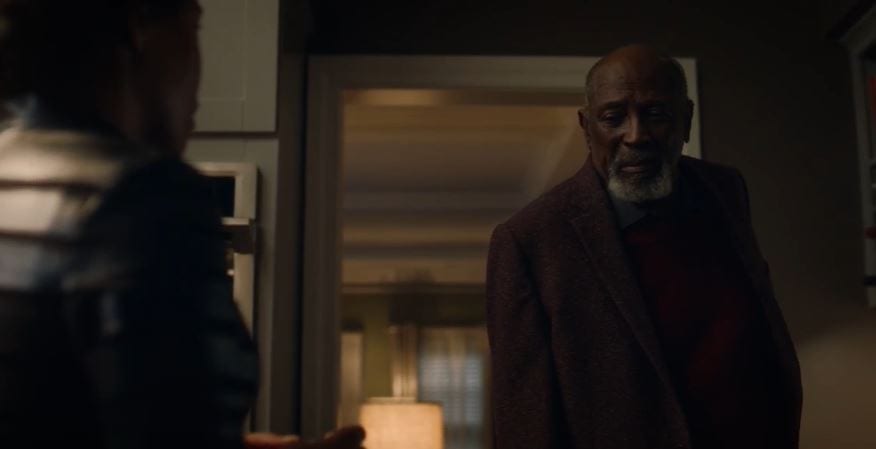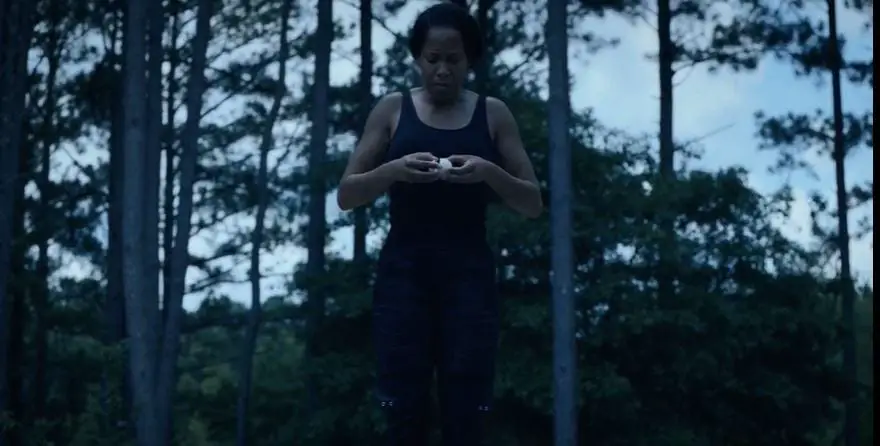All takes born from the ending of Lost that Damon Lindelof can’t end a story are officially canceled. The Leftovers, and the amazing scene of Nora telling her story of the universe where the 2% that vanished live, should have been enough. After Watchmen? Lindelof has cemented his reputation for the better. “See How They Fly” wraps up everything that needed to be wrapped up, does so in a satisfying way, and leaves the viewer with a lot to chew on.
Though I must say, after weeks of giving so much credit to Lindelof himself, it’s time to recognize the larger role of this writer’s room, actors, directors, and everyone else involved in this production. As Lindelof said in an interview with Rolling Stone, this wasn’t his story to tell. This was a story of race, pain, fear, legacy, and human suffering that came together because of a very talented and diverse group of people all contributing to a greater whole.

Going into this episode, there was a fairly obvious focus. Watchmen didn’t have that many plots to resolve. We needed to see if the 7th Kavalry would succeed in capturing Manhattan. We needed to see what Lady Trieu’s Millennium Clock would do. There was the question of the roles Angela, Laurie, Wade, and others would play.
Since most of these plots and players were brought together in preceding episodes, it left the finale with plenty of room to explore and resolve everything bit by bit. As I expected, Trieu was using the 7th Kavalry all along. Keene’s dreams of godhood end in a pool of bloody goop. Ozymandias did crash on that farm earlier this season, and he was the statue in Trieu’s vivarium. He was her father. Trieu’s Clock was meant to transfer Manhattan’s power to her, so she could solve all the problems she thought Manhattan should have.
In the end, the finale boiled the story down to legacy, the suffering that comes from it, and what we each can do to end this suffering. Trieu wanted to prove her worth to her father by one-upping his attempt to create world peace. Senator Keene wanted to fulfill his father’s goal, and the goal of white supremacists, by changing the world back to the way it used to be. They each wanted Manhattan’s power to do so. They each represent one side of the same cycle of suffering. One wants to end it, while the other wants to return to a previous suffering.
Meanwhile, Veidt represented a different side, one that doesn’t think the power of Manhattan should exist at all. He was very much the Lex Luthor to Dr. Manhattan’s Superman in the original Watchmen comic, and this analogy only grew stronger throughout this show. He believes in the power of humanity to solve humanity’s problems, yet can’t recognize how his narcissism has corrupted these intentions, or the continued suffering his schemes cause.
He did not save humanity with his squid. He created a different kind of suffering, as we see with Looking Glass and his trauma over the squid attack. We can see it with Will and Angela’s continued struggle to fully deal with the legacy of suffering among people of color.
The theater scene was a poignant, memorable one. Among all the godly, apocalyptic conflict happening outside, Angela and Will reunite at the theater where it all started to reflect on their lives and the legacy of race in America. It’s a well-placed, personal view of the stakes, the consequences of the Clock and Trieu’s near godhood. Everything comes back full-circle to the theater where Will watched Bass Reeves in the moments before the Tulsa massacre that began his story. Now we see the end for him, and the beginning of Angela’s next chapter.
It is an easy inference that Will knew Manhattan meant to pass his powers to Angela. He likely planned for it to happen. Is this why he was so insistent that Angela take his Nostalgia pills earlier this season? Did he need her to fully understand what he went through so that she could fully understand the gravity of having those powers? At the time I thought his line to Trieu about needing her to understand his decision was about Trieu’s plot, but now it seems he meant he and Jon’s plan to offer her the Manhattan legacy.
I’m surprised and disappointed to see so many people viewing the Watchmen finale as having reduced the story to a simplistic view of good vs. evil. I strongly disagree with these views because all of them seem to view the 7th Kavalry as the main antagonists of the story. In the end, they were nothing more than tools for Lady Trieu. She used them towards her own ends, as I and so many others have predicted for weeks.
The main conflict was never racism, or stopping the 7th Kavalry. It was about what we can do as people to end the many problems humanity faces. The overarching question left at the end of this episode involves the existence of Manhattan, and what should be done with his powers. The question posed is whether Trieu or Veidt is ultimately right. Should those powers be used to end racism, hunger, nuclear proliferation, and the like?
Is it okay for Angela to now have those powers? According to that Rolling Stone interview, the ending is not meant to be as open-ended as I initially assumed. They very much meant that as Angela inheriting Manhattan’s powers now. It was a plot point set up all season, especially in the use of eggs, and they did not put in all that work to leave her inheritance as an open-ended question.
Does it make a difference for Angela to have these powers compared to Trieu? While I don’t doubt Trieu’s intentions, I doubt the motivation behind her intentions. She was very much her father’s daughter, a raging narcissist with a god complex who wants to not only save the world, but be recognized for doing so. Her motivation is not rooted in a personal understanding of the problems she wishes to solve. Or if they at some point were, they no longer are.
Angela has a deeper understanding of this legacy of suffering, in large part because of the Nostalgia pills and also because of her own history of racial violence and suffering. Is this enough for her to responsibly wield such immense power? Can anyone be trusted to do so? Would all of them eventually develop the same disconnect from society that Jon did?
This question has always existed in the background of any Superman story, the idea that this one being is powerful enough to solve every problem facing humanity. Could they? Should they? What does it mean for humanity to have this being capable of solving our problems? Or is a Superman solving our problems inevitably susceptible to the same prejudices which lead to the same suffering as ever, only this time with a god playing dictator rather than a human being?
It’s not an easy question to answer and one that lends itself to endless debate. I find this question far more complex and morally ambiguous than Veidt’s plot in Alan Moore’s graphic novel. Veidt killing 3 million people to “save the world” was clearly an attack on the comic book industry, and specifically the megalomaniacal egos of superheroes. It’s an attack against the comic book industry, the same as Manhattan is towards Superman and Rorschach is towards The Question and Batman.
We’re not supposed to think Ozymandias did a good thing or is particularly justified for his murderous faux alien. We’re supposed to be horrified, just as we’re supposed to be horrified by Rorschach.
Watchmen examined this truth in a way that clearly makes some fans uncomfortable, but was ultimately needed. He made people face the truth of Veidt’s crime. The complexity of the comic’s ending was not in whether Veidt was right. It was in the meta. It was in the attacks on the superhero industry and the level of wrong involved. In comparison, there is a more morally ambiguous question posed by the various parties who wish to take Jon’s power for themselves, and in Angela choosing to take the power offered to her.
In many ways, Watchmen approached its source material the same way the comic did the comic book industry. It tore apart common perceptions to expose the uglier truths beneath. I think much of the controversy, besides race, had to do with having the perceptions fans have of Watchmen challenged so boldly. You could see it in every online discussion. People have views of the comic that the show did not share, and they clearly had a big problem with the show’s version of things.
Yet it also went about this challenge to the source with a greater love and respect than Moore did, because Lindelof’s intentions were different. The result was a more hopeful ending that represented the culmination of Watchmen’s exploration of generational racial suffering and one woman’s journey to come to terms with it.

Will tells Angela that “You can’t heal under a mask. Wounds need air.” Her choosing Jon’s power for herself was her taking the mask off and embracing herself. She has fresh wounds now, but they will heal. Angela will do right by the experiences that caused those scars.
Watchmen was one of the best shows of 2019 for many reasons. It was a fresh concept developed expertly and featuring a unique setting and atmosphere. The acting was fantastic and there were episodes that arguably stand among the best of the decade. It stands out in so many ways. Most of all because of the story it told.
In many ways, Damon Lindelof was simply the vehicle through which many others drove a story he admittedly could not tell, because it was not his story. It is a story I know I cannot fully understand because I am a white man lacking this experience. This was a story generations in the making, the result of racial legacies and suffering still being dealt with today. Lindelof was the name needed to tell this story. His experience helped shape it in some obvious Lindelof-y ways. However, it was a collaborative tale from a diverse group of creative minds working towards something amazing.
I was very skeptical when Watchmen was announced. It seemed so unnecessary and risky. I found it hard to find the purpose. Watchmen was a pleasant reminder of how any story can be told in a new way, with something new to say. Thank goodness this show existed.

